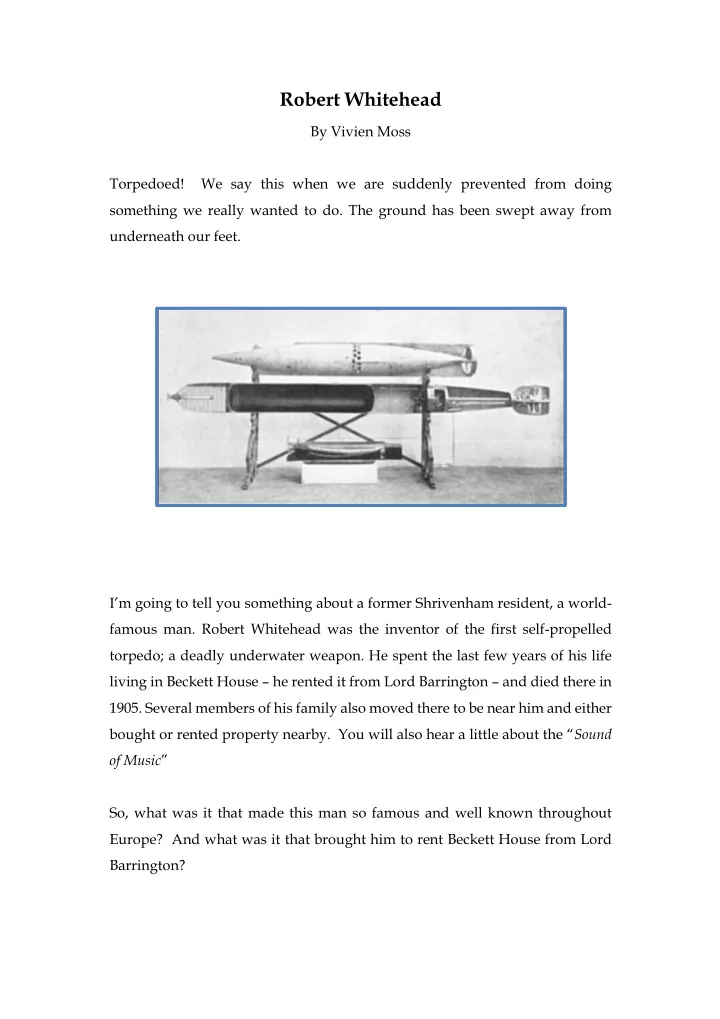

Robert Whitehead By Vivien Moss Torpedoed! We say this when we are suddenly prevented from doing something we really wanted to do. The ground has been swept away from underneath our feet. I’m going to tell you something about a former Shrivenham resident, a world- famous man. Robert Whitehead was the inventor of the first self-propelled torpedo; a deadly underwater weapon. He spent the last few years of his life living in Beckett House – he rented it from Lord Barrington – and died there in 1905. Several members of his family also moved there to be near him and either bought or rented property nearby. You will also hear a little about the “ Sound of Music ” So, what was it that made this man so famous and well known throughout Europe? And what was it that brought him to rent Beckett House from Lord Barrington?
He came from humble beginnings. His father worked as a bleacher in a cotton mill in Bolton. Robert left his Grammar School in Bolton at the age of 14 and went to the Mechanics Institute, Manchester in order to become an apprentice engineer. He qualified as an engineer and also as a draughtsman and then went to work for his uncle in France. Three years later, at the age of 24 he sought independence, started his own business which was marine engineering and formed his own company in Milan. This company was very successful, and he designed and built marine engines for Austrian warships. When the Austrian Government suggested making a weapon carrying an explosive, it kept Robert occupied for several years before he perfected his first torpedo in 1870 which you can see below, is cigar-shaped and this first one had a range of about 700 yards. It was so successful that the Austrian government immediately placed an order. By 1872 nearly all the countries with naval power were taking note of this new weapon, including America, just emerging from its Civil War. The Royal Navy was Whitehead’s best customer and it wasn’t long before the Admiralty took a firm stand and insisted that the torpedoes be built in Britain OR they would cancel the order. By this time Robert Whitehead had refined and improved the torpedo so that it had a range of over 1000 yards and
measured 18 feet long and maintained a pre-set underwater course. It carried 18 pounds of dynamite in its nose and was a deadly weapon. So, what of Robert Whiteheads personal life? He married Frances in England in 1846 before moving abroad. They had 6 children. His son John took an active interest in the invention of the torpedo and later became the Managing Director of the company when his father retired. Robert’s business had bloomed and he had become a very wealthy man. During the course of his life the family became linked by marriage to the old influential Hapsburg aristocracy; and later to the German Chancellor Bismark. His great granddaughter met and married a marine Commander by the name of Captain Georg Von Trapp. All the aficionados of the “ Sound of Music ” will recognise the name and know she was Captain Von Trapp’s first wife.
And how did Robert Whitehead respond to the Admiralty’s ultimatum? He decided, maybe with advancing years, to return to England. He moved his factory to Portland Harbour at Ferrybridge near Weymouth. It proved to be a most successful business. In addition to the factory buildings there was development of the site for houses, shops, schools, a hospital, churches and of course pubs. Following his retirement, he rented Beckett House from Lord Barrington. The Barringtons often wintered abroad in Italy, Austria and Germany and we know that Robert Whitehead moved in aristocratic circles so it is quite possible that their paths over-lapped and this may be how the renting out of Beckett House took place. We understand he enjoyed his time in Shrivenham where he died in 1905. Earlier I mentioned that several of his family members came to live in the village or somewhere on the Beckett Estate. While researching material for this talk it just happened that Robert Gay was clearing out one of his barns and asked if we might be interested in having a look at the “ Old Bier ,” (a carriage for conveying coffins at funerals). I had only ever seen a photo of it and was amazed at its excellent condition. There is an interesting brass plaque on the side which reads “ Presented to the parish of Shrivenham by Rear Admiral Charles Drury in memory of his beloved wife who died at Beckett on 22 February 1900 ”. Who was Charles Drury? The sleuths got working and this is he: the husband of Robert Whitehead’s eldest daughter Frances, living at Beckett. It does not
say Beckett House so we think they may have been living at one of the larger farmhouses owned by the Barrington family on the estate. The Bier was an historically valuable piece of history. It’s good condition, thanks to the efforts of Robert Gay in keeping it safe, and its connection with Robert Whitehead, I approached the Science Museum at Wroughton with a view to taking custody of it. I was delighted when they agreed that it should be preserved and displayed at the museum. Consequently, it was picked up by them in October 2018.
A sad thing in connection with this tale of Robert Whitehead is that his death was reported in almost every newspaper and journal abroad. They honoured this very able engineer with decorations and distinctions in abundance. The Times drew attention to the fact that he had died without being honoured by the country of his birth. Yes, there is a commemorative stone at the site of his very successful company at Ferrybridge, and a plaque on his grave. But he was never officially recognised by the British government.
FINIS
Recommend
More recommend